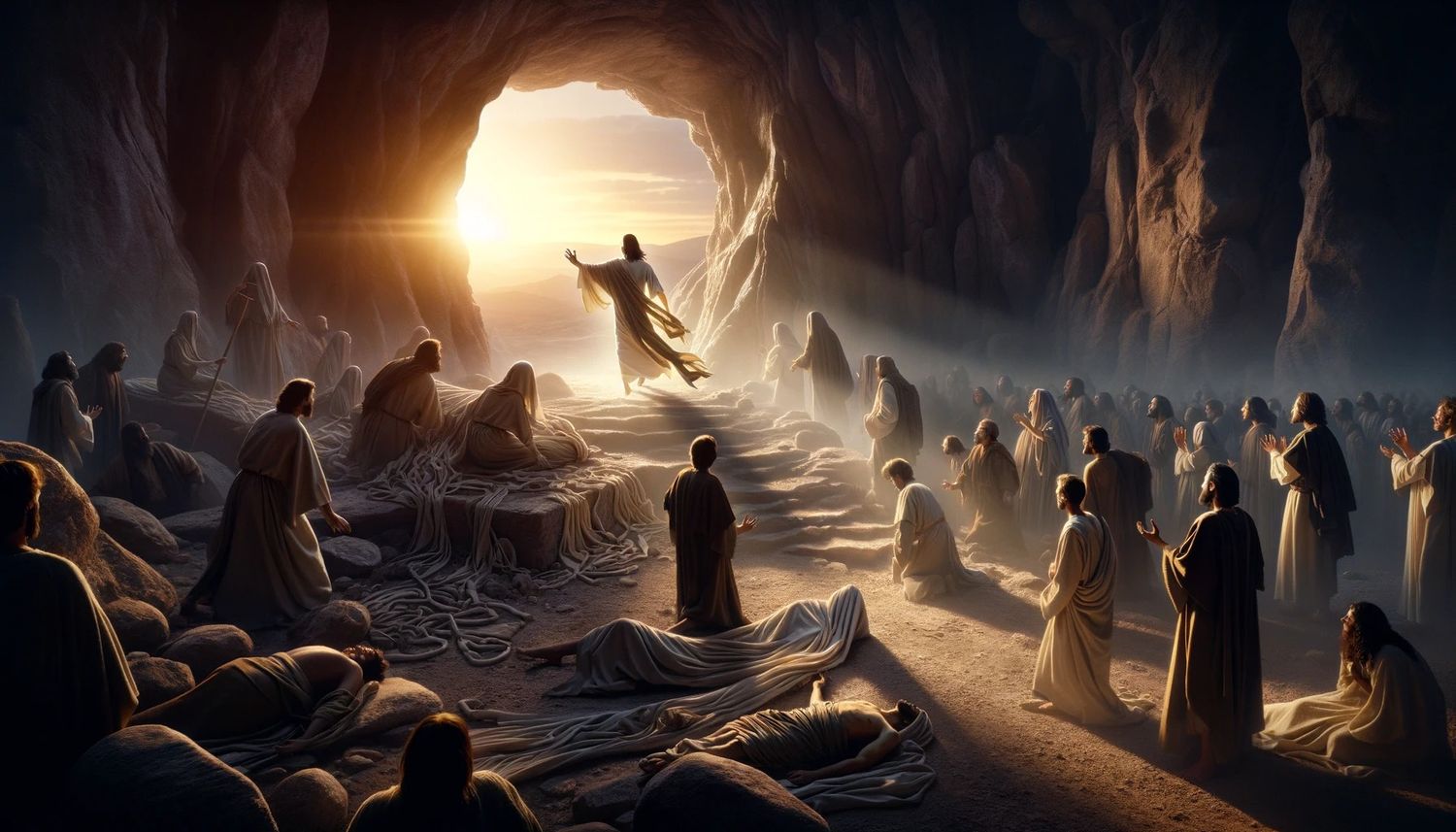Home>Christian Videos>Bible Stories>When Jesus Returns, The Dead In Christ Will Rise


Bible Stories
When Jesus Returns, The Dead In Christ Will Rise
Published: February 29, 2024
Ericka Andersen, an editor at Christian.net, expertly merges digital strategy with content creation, focusing on faith and societal issues. Her communication skills enhance the platform's engaging narratives, fostering meaningful dialogue on belief's impact on society.
Discover the powerful biblical account of the return of Jesus and the resurrection of the dead in Christ. Explore this compelling Bible story and its profound significance.
(Many of the links in this article redirect to a specific reviewed product. Your purchase of these products through affiliate links helps to generate commission for Christian.net, at no extra cost. Learn more)
Table of Contents
The Promise of Resurrection for Believers
The promise of resurrection for believers is a fundamental belief in Christianity. It is the assurance that those who have placed their faith in Jesus Christ will experience resurrection and eternal life. This promise is rooted in the teachings of Jesus and the writings of the apostles in the New Testament. The concept of resurrection is not only a future hope but also a present reality for believers, shaping their understanding of life, death, and the afterlife.
-
Biblical Foundation: The promise of resurrection for believers is firmly grounded in the Bible. The apostle Paul, in his first letter to the Corinthians, writes, "For as in Adam all die, so in Christ all will be made alive" (1 Corinthians 15:22, NIV). This verse highlights the contrast between the spiritual death that came through Adam and the spiritual life that comes through Christ. It emphasizes the hope of resurrection for those who are united with Christ.
-
Victory Over Death: The promise of resurrection offers believers the hope of victory over death. In the Gospel of John, Jesus declares, "I am the resurrection and the life. The one who believes in me will live, even though they die" (John 11:25, NIV). This statement by Jesus underscores the transformative power of faith in him, assuring believers that physical death is not the end, but rather a transition to eternal life.
-
Redemption of the Body: The promise of resurrection for believers includes the redemption of their physical bodies. In his letter to the Romans, Paul writes, "And if the Spirit of him who raised Jesus from the dead is living in you, he who raised Christ from the dead will also give life to your mortal bodies because of his Spirit who lives in you" (Romans 8:11, NIV). This verse emphasizes the role of the Holy Spirit in the future resurrection of believers, highlighting the continuity between their present bodies and their resurrected bodies.
-
Transformation and Glory: The promise of resurrection for believers also entails a transformation into glorious, imperishable bodies. Paul, in his first letter to the Corinthians, describes this transformation, stating, "The body that is sown is perishable, it is raised imperishable; it is sown in dishonor, it is raised in glory; it is sown in weakness, it is raised in power" (1 Corinthians 15:42-43, NIV). This transformation signifies the culmination of God's redemptive work, bringing about the full restoration of believers in body, soul, and spirit.
In summary, the promise of resurrection for believers is a central tenet of the Christian faith, offering hope, assurance, and comfort in the face of mortality. It is a promise rooted in the teachings of Jesus and the apostles, providing believers with the confidence that death is not the end, but the gateway to eternal life in the presence of God.
Read more: When Is Jesus Christ Returning
The Nature of the Return of Jesus
The nature of the return of Jesus is a topic of profound significance in Christian theology and eschatology. The New Testament presents the return of Jesus, also known as the Second Coming, as a climactic event that will fulfill God's ultimate plan for the redemption and restoration of the world. The nature of this return encompasses various aspects that are central to Christian belief and anticipation.
-
Imminence and Expectation: The return of Jesus is characterized by the sense of imminence and expectation within the Christian community. Throughout the New Testament, believers are encouraged to be watchful and prepared for the coming of the Lord. The Gospel of Matthew records Jesus' own words, "So you also must be ready, because the Son of Man will come at an hour when you do not expect him" (Matthew 24:44, NIV). This sense of imminence underscores the urgency and anticipation associated with the return of Jesus.
-
Global and Visible Event: The return of Jesus is depicted as a global and visible event that will be witnessed by all. In the Gospel of Matthew, Jesus describes his return in unmistakable terms, stating, "At that time the sign of the Son of Man will appear in the sky, and all the nations of the earth will mourn. They will see the Son of Man coming on the clouds of the sky, with power and great glory" (Matthew 24:30, NIV). This portrayal emphasizes the universal and public nature of Jesus' return, transcending cultural, geographical, and historical boundaries.
-
Judgment and Redemption: The return of Jesus embodies both judgment and redemption. It is portrayed as a time of reckoning, where the righteous will be vindicated and the unrighteous will face divine judgment. The apostle Paul, in his second letter to the Thessalonians, writes about the dual nature of Jesus' return, stating, "He will pay back trouble to those who trouble you and give relief to you who are troubled" (2 Thessalonians 1:6-7, NIV). This duality underscores the transformative impact of Jesus' return, bringing justice to the oppressed and deliverance to the faithful.
-
Transformation of Creation: The return of Jesus is linked to the transformation of creation and the establishment of God's kingdom in its fullness. The apostle Peter, in his second letter, speaks of the renewal of the heavens and the earth in connection with the return of Jesus, stating, "But in keeping with his promise we are looking forward to a new heaven and a new earth, where righteousness dwells" (2 Peter 3:13, NIV). This vision of renewal and restoration underscores the cosmic implications of Jesus' return, signaling the culmination of God's redemptive purposes for the entire created order.
In essence, the nature of the return of Jesus encompasses the elements of imminence, global visibility, judgment, redemption, and cosmic transformation. It is a foundational belief that shapes the hope and expectation of believers, inspiring them to live in readiness for the fulfillment of God's ultimate plan through the return of Jesus.
The Hope of Reuniting with Loved Ones
The hope of reuniting with loved ones is a deeply cherished belief within the Christian faith, particularly in the context of the promise of resurrection and the return of Jesus. This hope is rooted in the assurance that the bond of love shared with family members, friends, and fellow believers transcends physical death and will be ultimately reaffirmed in the presence of God. The prospect of being reunited with loved ones in the eternal kingdom is a source of comfort, solace, and anticipation for believers, shaping their perspective on mortality and the afterlife.
-
Continuity of Relationships: The hope of reuniting with loved ones affirms the continuity of relationships beyond the grave. In his first letter to the Thessalonians, the apostle Paul writes, "For the Lord himself will come down from heaven, with a loud command, with the voice of the archangel and with the trumpet call of God, and the dead in Christ will rise first" (1 Thessalonians 4:16, NIV). This passage emphasizes the reunion of believers, highlighting the enduring nature of their relationships within the framework of God's redemptive plan.
-
Joyful Reunion: The hope of reuniting with loved ones evokes the anticipation of a joyful and blessed reunion in the presence of God. The book of Revelation portrays a vision of this future reunion, depicting a scene where God will dwell among his people, wiping away every tear and eradicating sorrow, pain, and death (Revelation 21:3-4, NIV). This portrayal underscores the profound sense of joy and fulfillment associated with the prospect of being reunited with loved ones in the eternal kingdom.
-
Eternal Communion: The hope of reuniting with loved ones extends to the concept of eternal communion and fellowship in the presence of God. The apostle John, in his first letter, expresses this hope, stating, "Dear friends, now we are children of God, and what we will be has not yet been made known. But we know that when Christ appears, we shall be like him, for we shall see him as he is" (1 John 3:2, NIV). This verse encapsulates the expectation of believers to be united with their loved ones in the likeness of Christ, experiencing the fullness of divine communion for eternity.
-
Healing and Restoration: The hope of reuniting with loved ones encompasses the promise of healing and restoration from the pain of separation and loss. The prophet Isaiah, in the Old Testament, prophesies about the restoration and joy that will accompany the reunion of God's people, declaring, "And the ransomed of the Lord will return. They will enter Zion with singing; everlasting joy will crown their heads. Gladness and joy will overtake them, and sorrow and sighing will flee away" (Isaiah 35:10, NIV). This prophetic vision encapsulates the hope of believers for complete healing and restoration in the context of reuniting with loved ones in the presence of God.
In essence, the hope of reuniting with loved ones is a profound and transformative aspect of Christian belief, offering solace, joy, and anticipation in the face of separation and loss. It is a hope that transcends the boundaries of time and mortality, pointing to the eternal communion and fulfillment that awaits believers in the presence of God and their loved ones.
The Assurance of Eternal Life in Christ
The assurance of eternal life in Christ is a foundational and central tenet of the Christian faith, providing believers with confidence, hope, and security in their relationship with God. This assurance is rooted in the redemptive work of Jesus Christ and the promises articulated in the New Testament, offering believers the certainty of eternal communion with God and the fullness of life beyond the constraints of mortality.
-
Promise of Eternal Life: The assurance of eternal life in Christ is grounded in the explicit promises of Jesus himself. In the Gospel of John, Jesus declares, "I give them eternal life, and they shall never perish; no one will snatch them out of my hand" (John 10:28, NIV). This statement underscores the unshakable nature of the gift of eternal life bestowed upon believers by Jesus, providing them with the assurance of security and permanence in their relationship with God.
-
Redemption and Reconciliation: The assurance of eternal life in Christ is inseparable from the concepts of redemption and reconciliation. The apostle Paul, in his letter to the Romans, emphasizes the transformative impact of Christ's redemptive work, stating, "For if, by the trespass of the one man, death reigned through that one man, how much more will those who receive God's abundant provision of grace and of the gift of righteousness reign in life through the one man, Jesus Christ" (Romans 5:17, NIV). This passage highlights the assurance of reigning in life through Jesus Christ, signifying the restoration and reconciliation of believers to God, leading to eternal life.
-
Sealed by the Holy Spirit: The assurance of eternal life in Christ is further affirmed by the presence and work of the Holy Spirit in the lives of believers. The apostle Paul, in his letter to the Ephesians, writes about the sealing of believers with the Holy Spirit as a guarantee of their inheritance, stating, "And you also were included in Christ when you heard the message of truth, the gospel of your salvation. When you believed, you were marked in him with a seal, the promised Holy Spirit, who is a deposit guaranteeing our inheritance until the redemption of those who are God's possession—to the praise of his glory" (Ephesians 1:13-14, NIV). This passage underscores the role of the Holy Spirit as a divine seal and deposit, assuring believers of their eternal inheritance in Christ.
-
Victory Over Death: The assurance of eternal life in Christ encompasses the victory over death and the promise of resurrection. The apostle Paul, in his first letter to the Corinthians, proclaims the triumph of eternal life over death through Christ, stating, "Where, O death, is your victory? Where, O death, is your sting? The sting of death is sin, and the power of sin is the law. But thanks be to God! He gives us the victory through our Lord Jesus Christ" (1 Corinthians 15:55-57, NIV). This declaration highlights the assurance of victory and triumph over the ultimate enemy, securing believers in the promise of eternal life in Christ.
In summary, the assurance of eternal life in Christ is a profound and transformative reality for believers, offering them the confidence of unending communion with God, the assurance of redemption and reconciliation, the sealing of the Holy Spirit, and the victory over death. It is a hope that transcends the temporal and finite nature of earthly existence, pointing to the eternal and abundant life that believers possess in their union with Christ.















